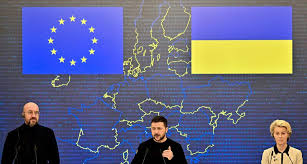The paper explores the role of the European Union (EU) in the war in Ukraine, from the run-up of the war to its impact on the EU’s future structure and functions, within Europe and globally. It begins with an account of the condition of the EU before the war, which it describes as overextended and stagnant with respect to the EU’s proclaimed finalité, the “ever closer union of the peoples of Europe.” Next, it recounts the use of the EU in early American attempts to include Ukraine in the East European enlargement of NATO, with EU membership as a reward for Ukrainian Westernization. To the EU leadership, this presented an opportunity to revive older, by then largely failed attempts at supranational unification and centralization, by offering to the United States to serve as its transatlantic base for its Ukrainian strategy. Following this, the paper explores the consequences for the EU and its stronger member states of the impending American withdrawal from the Ukrainian war theater, as the US turns to its conflict with China. The final section discusses the conditions under which Europe, the European states, and the EU can hope for some kind of strategic and political autonomy in the emerging new New World Order.
Related Articles

Finance
The hunt for Toys R Us’ missing millions: Investigators probe a £580m loan moved to a tax haven just months before the store went bust
As usual, in the end we shall discover that this was “completely legal” and the pension fund will be left with a massive deficit. Read here

Energy
Balkan Green Energy News: Rio Tinto divides up Jadar lithium project in Serbia to avoid overall environmental assessment
Rio Tinto is attempting to portray the potential environmental impacts of its Jadar project in Serbia as smaller than they are, Read HERE Image: Munjiruld/Creative Commons

Geopolitics
Eldar Mamedov: Azerbaijan is already friendly with Israel. Why the push to ‘normalize’?
Smells like another pressure campaign against Iran. Read HERE Ilham Aliyev, president of Azerbaijan, Photo: Creative Commons


Be the first to comment